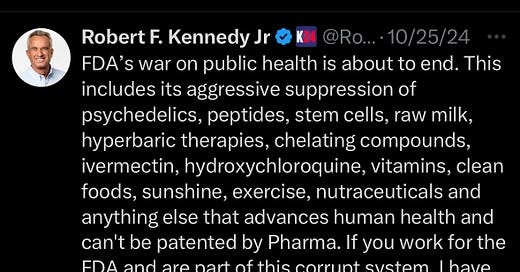Does RFK Jr. have some good ideas in this tweet?
An honest question deserves a thorough answer.
A long time patient of mine asked me several times this year whether I too liked RFK Jr. as a presidential candidate. I respect this patient. By default I respect and feel great compassion for anyone who is seeking medical help as a vulnerable person with problems. We are all patients. This person too has his share of medical issues, midlife struggl…
Keep reading with a 7-day free trial
Subscribe to Examined to keep reading this post and get 7 days of free access to the full post archives.




